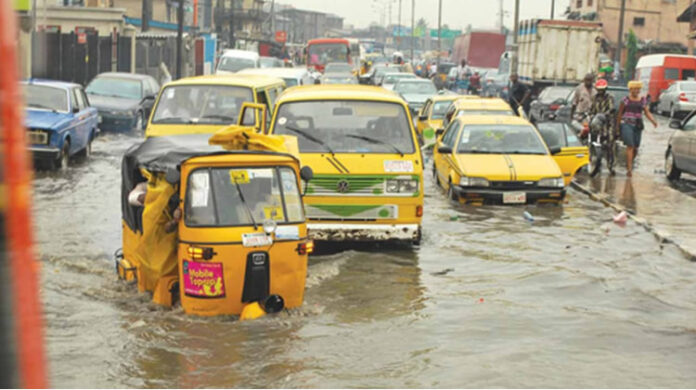A tense atmosphere lingers over Lagos, Nigeria’s bustling economic center, especially across the Island axis, as residents brace for what experts warn could be one of the most severe flooding seasons in recent memory.
The anxiety intensified following a recent alert from the Nigeria Hydrological Services Agency (NIHSA), which, in its 2025 Annual Flood Outlook released last week in Abuja, identified Lagos among the states at high risk of intense flooding.
Minister of Water Resources and Sanitation, Professor Joseph Utsev, who presented the report, urged residents in vulnerable areas—particularly Lagos Island, Lekki, Victoria Island, Ikoyi, and Ajah—to prepare for significant flooding driven by heavy rainfall, rising sea levels, and the city’s overburdened drainage infrastructure.
For many Lagosians, the fear is all too familiar. The city’s location along the Atlantic coastline has made it susceptible to frequent and destructive floods over the years—events that have consistently damaged homes, disrupted businesses, and displaced families.
One of the most devastating incidents occurred in 2012, when relentless July rains led to extensive flooding across key areas. Streets like Ahmadu Bello Way, Ozumba Mbadiwe, and Marina were submerged, rendering roads impassable and leaving people stranded in waist-deep water. Entire neighborhoods in Ikoyi, Lekki Phase 1, Victoria Island, and Ajah were inundated, forcing residents to flee and leaving property worth millions of naira destroyed.
In light of NIHSA’s forecast, many residents have voiced deep concern about what lies ahead.
Funmi Adebayo, a civil servant living in Lekki Phase 1, told *DAILY POST*, “Whenever the rains start, we’re filled with dread. Last year, floodwaters entered my home and ruined furniture and appliances worth over N2 million. These yearly warnings only highlight how helpless we feel.”
Kennedy Terfa, a media professional based in Victoria Island, echoed similar frustrations: “Flooding has become a routine here. In 2022, a major downpour wrecked our office equipment, including the server. Every year the government promises solutions, but we’re yet to see lasting change.”
Titi Balogun, a teacher in Oniru Estate, described how the floods disrupt her life: “During rainy months, I barely sleep. We’re constantly monitoring water levels. Last year, a neighbor’s fence collapsed from the water pressure. It’s frightening, especially with children around.”
Commercial driver Ayo Shonibare, who operates along the Ajah–Lekki–Victoria Island route, added: “Once it rains, the whole area shuts down. Bad roads and clogged drains make driving risky. You either damage your car or stay home and lose money. This shouldn’t be the reality in a city like Lagos.”
In response to the growing unease, the Lagos State Government has reaffirmed its readiness to handle the forecasted downpours and mitigate flood risks, especially in high-risk zones across the Island.
Commissioner for the Environment and Water Resources, Tokunbo Wahab, during an inspection of the Lagos Island Urban Regeneration Project, assured residents that proactive measures are already in motion.
He stated that the Emergency Flood Abatement Gang (EFAG) has been fully mobilized for year-round operations, focusing on clearing blocked drainage channels, cleaning canals, and addressing flood-prone areas.
“This is not business as usual,” Wahab said. “Our drainage maintenance and urban renewal projects are in full swing across flood-prone parts of Lagos. EFAG teams are actively working throughout the state to minimize the risk of disaster.”
He also urged residents to support government efforts by refraining from indiscriminate waste dumping, which continues to block drainages and worsen flooding.

